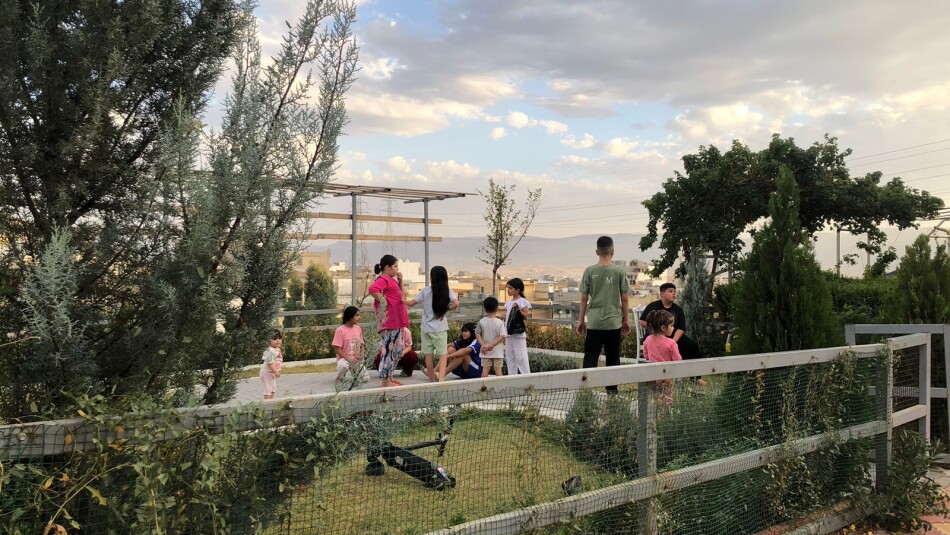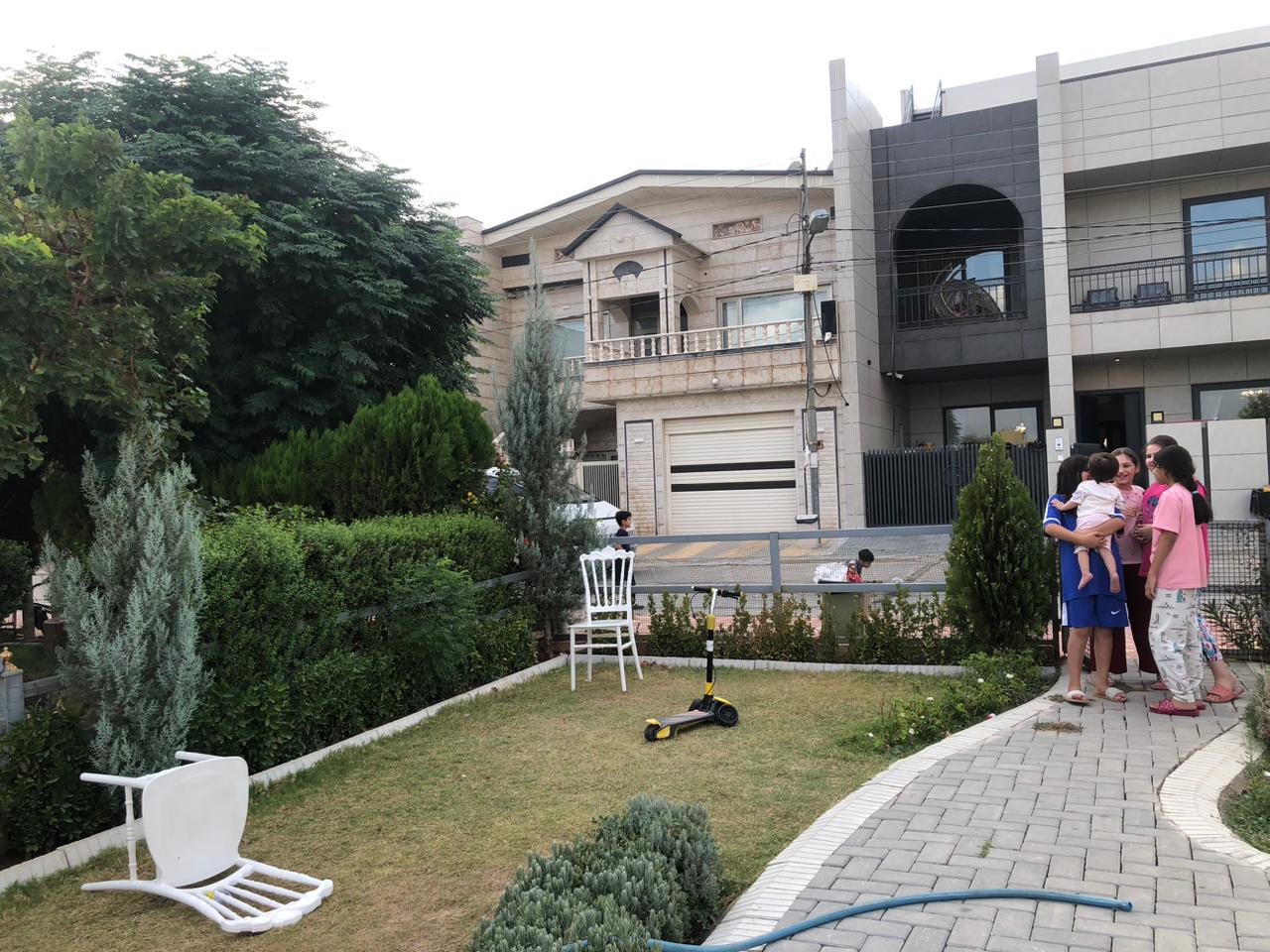
Over the years, the abandoned land in front of Shirin Kamal’s house was gradually turning into a garbage dump, and its appearance and the smells emanating from it became a source of annoyance for the neighborhood’s residents. Shirin decided to take action out of concern for the environment of her area and fear that the type of land on which the garden was to be built would be converted into residential land.
The land is located on the main street of the “Majid Begk” neighborhood in the center of Sulaymaniyah Northern Province, and its area is 800 square meters. The Sulaymaniyah Municipality allocated it as part of its plans to establish a garden. Although the neighborhood was founded in the 1980s, yet the land remained abandoned.
In 2019, Shirin, a lawyer who spent her childhood years witnessing the land being turned into a garbage dump, submitted a request to the municipality to allow her to create a garden on the land.
"I wanted to get rid of the waste that was thrown there. Sometimes they would slaughter livestock there and leave their waste. The smells were unbearable and the sight was unpleasant. I have lived with these scenes since my childhood," Shirin recalled.
The starting point
What made Shirin hurry up was seeing one of the cement transport trucks (tankers) belonging to a construction company disposing of the remaining cement and leaving it on the deserted land in front of her house. She documented what she saw by filming a video clip and the next day she informed the company of its intention to "file a lawsuit against it if it did not remove the cement."
"The company apologized and pledged to clean the plot of land as soon as possible, then they brought a bulldozer and a vehicle and removed the piles of cement and waste," Sherine said.
Her next step was to follow up on the request she submitted to the municipality. "Fortunately, they accepted my request and I started working."
A 40-Year-Old Landfill Transformed into an Olive Grove
After clearing the land of waste, Shirin hired four workers at her own expense to prepare holes for planting trees, which cost her 200,000 Iraqi dinars IQD (USD130).
In addition, she bought 100 olive seedlings for $100 and planted it with her mother and colleagues.
Five years after the request she submitted to the municipality, the landfill has become an olive grove that Shirin and her mother take care of daily, while the municipality helps by providing water.
This step came because the Sulaymaniyah Municipality stopped establishing parks and gardens within the city years ago and became unable to take care of the existing parks in the necessary manner.
Behrouz Salar, the Director of Sulaymaniyah Parks, explained that the shortage of municipal staff and the lack of financial support were among the reasons that forced them to entrust the task of establishing parks to investors by giving them plots of land to build residential units on the condition that 25% of the area be allocated for establishing parks.
"Establishing parks requires sustainability. Every year, 15 employees in the Sulaymaniyah Municipality retire without appointing others to replace them."

There are no official statistics that specify the percentage of green spaces in Sulaymaniyah, but the local government claims that the percentage is close to 15%, which is less than the international standard that stipulates that the percentage should not be less than 30%.
The director of Sulaymaniyah parks says that they are grateful to any citizen who establishes a park or plants trees in front of his house, provided that they adhere to the instructions.
According to the instructions of the municipality and the parks department, the municipality does not object to citizens converting abandoned lands in front of their houses into orchards or gardens, provided that they are not fenced, no rooms and not used for private purposes.
"At first, the municipality objected to the type of trees and stipulated that they should not be fruitful trees because the instructions do not allow that, but I insisted that they be fruitful, so the municipality finally agreed," Shirin affirmed.
The first olives ripened this year, and the children of the neighborhood have been eating organic mulberry of two trees planted two years ago.
“This year was the first olive tree production, which reached about 10 kilograms,” according to Shirin.
She planted about 100 olive trees in the 800-square-meter garden, surrounded by a number of mulberry and fig trees.
We will remove them whenever we want
Shirin is an example of dozens of others in Sulaymaniyah who have taken the initiative to boost green spaces by creating small gardens and trees in front of their homes, especially in places previously designated by the municipality for the establishment of gardens.
Shokhan Abdullah (38 years old), who lives in a popular neighborhood in Sulaymaniyah, says that when she bought a plot of land to build her house in the neighborhood, she inquired about the abandoned plot of land in front of her house, whether it was serviceable or not.
“We started building the garden while building our house, after we learned that the abandoned land was allocated for building a garden within the municipality’s plans,” Shokhan added, adding that she took on the task because the municipality was not ready to turn it into a garden, and at the same time did not object to her initiative.
The area of the garden that Shokhan and her husband take care of is only 100 square meters, but the total area of the land allocated for building the garden in the municipality’s maps is much larger, some of which was turned into gardens by neighbors.
“Taking care of the garden is not easy at all, because I have four children to take care of as well, sometimes we hire a gardener at our own expense, and this costs us a lot.”
The municipality has the right to remove these volunteer green spots whenever it wants, even if the trees are more than 10 years old, as the spokesperson for the Parks Directorate stressed.
Sulaymaniyah Municipality officials said that they do not have statistics on the area of land that citizens have taken care of to turn into gardens, but it is not a small area.
In the summer, Shokhan is forced to buy water from mobile tanks to water the garden. The price of a tank ranges between 15,000 and 20,000 IQD, “however, we are happy to see the greenery in front of our house.”
The situation is somewhat different for Shirin Kamal, because the municipality provides water by tankers weekly, and municipal gardeners clean the garden once a month. However, the problem of watering the gardens remains one of the obstacles to increasing the percentage of green spaces in Sulaymaniyah.
506 gardens and parks were established in Sulaymaniyah by 2024, seven of which are large parks and 85 of which are medians - established between the main streets - according to statistics from the Parks Directorate.
Shirin did not hide that one of the reasons that prompted her to establish the garden was her fear of changing the type of land to a residential plot.
"One of the mistakes we made at the beginning was the small size of the seedlings we brought, as their height ranged between 20 to 30 centimeters, and it took a long time to grow."
Currently, Shirin supervises the watering of the garden herself by installing two tanks and using a drip system. She covered all the expenses, but she says that her neighbors expressed their willingness to provide assistance.
Another challenge facing the initiative is that such parks are illegal despite obtaining the municipality’s approval, “because the municipality did not establish them itself,” according to the director of Sulaymaniyah Parks.
This means that the municipality can remove them whenever it wants, even if the trees are more than 10 years old, as stressed by the spokesman for the Parks Directorate, Ali Hamid.
“We do not prevent anyone from converting the land in front of their homes into parks if it is designated for that purpose in the municipality’s maps and designs, but we also informed them that they do not have the right to prevent us from removing them whenever we want.”
We must realize that every tree requires a lot of effort to grow and reach 10 years of age, it is unreasonable to remove it then
These initiatives come at a time when the local government in Sulaymaniyah stresses that it is currently unable to establish more parks and gardens due to the lack of the necessary budget.
“We do not have the ability to convert every piece of land that is one donum (0,1 hectare) or more into a park,” Ali said. However, he explained that “anyone who decides to turn the plot of land in front of their house into a garden, provided that it was originally designated for building a garden, “we can provide 200 to 500 seedlings and help them with watering and cleaning.”
As an alternative to increasing the greenery, the Sulaymaniyah Municipality requires investment companies to allocate 25 percent of the land area granted to them to build residential units for green spaces, and this is part of the laws and regulations in effect in the Kurdistan Region of Iraq KRI.
Marouf Majeed, head of an environmental organization, stresses the importance of these initiatives in order to increase the greenery, but he sees that they face some obstacles.
“When the government does not do its duty to create gardens and parks, it must at least have a basic design (master plan) for these sites, because it is unreasonable for it to later remove the trees planted by people when it decides to build the garden itself,” Majeed said.
“We must realize that every tree requires a lot of effort to grow and reach a lifespan of 10 years, it is unreasonable to remove it then.”